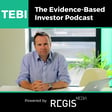Become a Creator today!Start creating today - Share your story with the world!
Start for free
00:00:00
00:00:01

Ep 19: Tim Edwards on SPIVA, momentum investing and equal-weighting
We talk to Tim Edwards, discussing such topics as SPIVA, the trend towards self-indexing, and recent research he’s done on momentum investing and the case for equal-weight indices. And, for fans of active management, he even spells out the areas where active managers perform least badly.
Transcript
Introduction with Tim Edwards
00:00:05
Speaker
Hello and welcome to the latest Tebbe podcast brought to you by the evidence-based investor in conjunction with Regis Media, connecting advisors with clients. I'm Robin Powell. Our guest this week is Tim Edwards from S&P Dow Jones Indices in London. Tim is managing director of Index Investment Strategy. Well, welcome, Tim. Thank you for joining us. So what exactly does that job title mean?
00:00:34
Speaker
First of all, thanks for having me, and it's great to see you again. So I work in a small team of researchers, and what we try to do is to help people understand how indices can be used in an investment context, as well as what they're telling you about the world today. So it's a pretty wide mandate. Another definition for what we do is we try and do interesting work that shines a light on indices.
Understanding SPIVA Reports
00:01:03
Speaker
Now many of our listeners probably most in fact will know all about SPIVA but for those who don't know about SPIVA what on earth is it? So SPIVA it's an acronym it stands for S&P Index versus Active and it's a series of reports that come out well the main one comes out every six months in several different markets
00:01:27
Speaker
and we use a local market database to identify, first of all, all the active funds that have been operating in a particular category like UK equities or Danish equities or US large caps, and they will report all sorts of statistics. It's actually a very rich report. Most people tend to focus on the top line number, report one, which reports the percentage of funds that beat the benchmark.
00:01:52
Speaker
What's really interesting is that you started off in the United States, but now you look at countries all around the world. Yeah, that's right. So the first ever SPIVA report was in the United States. That's just over 15 years ago now. It's now extended and expanded to cover the European fund market, Australia, Japan, Pan Asia, India, Latin America and Canada.
00:02:19
Speaker
Now, when I started writing a few years ago about the shortcomings of active management, a senior manager at a well-known UK fund supermarket, he said, Robin, you keep quoting American data. Actually, the UK is different. UK managers have a proven track record of beating the market, or actually better, he was suggesting, than US money managers. What does your evidence actually show?
Global Market Differences in Active Funds
00:02:48
Speaker
Well, it's actually quite a balanced picture. But balanced, if you look at UK active funds investing in UK equities, they do in fact have a slightly better record than US managers invested in US equities. And the reasons for that we can perhaps discuss. But the most important fact to highlight there is actually the record of UK managers is in fact better.
00:03:15
Speaker
However, that doesn't mean so much as to say that the average UK active fund outperforms its benchmark. In fact, over the long term in the UK, just as in the US, less than half of my active managers outperform.
00:03:34
Speaker
And what's particularly interesting I find about your research is this added component you have now on persistence. And that scorecard consistently shows that there is a lack of persistence in our performance. Yeah, and let me give you a bit of context of that. So as I say, Spiva's been around for quite some time, 15 years now.
00:03:54
Speaker
in the US and the typical reaction by people who use active funds is in a sense I don't care if 70% or 80% or even 90% of active funds under before because I pick good funds and you know my funds doing fine so the challenge is then okay well can we in some sense integrate that objection or solve for that problem?
00:04:22
Speaker
So what the persistence reports do is they look at good funds. So the way we define a good fund is a fund that has historically outperformed. And what the persistence reports do is they look at the extent to which funds that have performed well continue to perform well.
00:04:43
Speaker
must be said there are other ways to identify active managers except for past track record but if skill exists and is identifiable you would expect it to turn up in prior performance.
00:04:56
Speaker
And what these reports show is that over time it is actually not the case that just focusing on the top half of all funds or the top quartile of all funds historically really gives you any better chance of outperforming than just picking at random.
00:05:14
Speaker
And of course, the problem is you've got to identify the future winners in advance before they start outperforming my experiences. I don't know if this is yours as well, but many of those who claim to be able to spot these winners are actually just very good at being able to tell you who's done well in the past.
00:05:34
Speaker
Well, one of the things that distinguishes the SPIVA reports and persistence reports from a lot of other similar reports, for example, articles in the media, here are 20 funds in the UK and their record over the past 20 years or whatever it is, what distinguishes our report is survivorship.
00:05:52
Speaker
So 10 years ago, there were many funds on sale that were available then that in the last 10 years either wound up because of underperformance or were converted into a completely different kettle of fish. And our reports include that earlier opportunity set. We look at the point in time, what could you have invested in then? And what's their long term record?
00:06:17
Speaker
Conversely, if you just look at all the funds which are alive today and have a 10 or 20 year track record, you will find that actually a lot of them did outperform. That's survivorship bias. The ones that did very badly or that didn't do well in the financial crisis, they haven't continued to this date.
00:06:37
Speaker
As you were saying, the results for these various SPIVA reports around the world are sort of remarkably consistent, but there are differences. You pointed out, for example, that UK managers do better in the UK than US managers do in the US. I'm intrigued by that. Where in the world are the best fund managers?
Unique Market Dynamics: Denmark and Small Caps
00:06:59
Speaker
Well, it does depend when you look. One of the more interesting markets is the Danish fund management market. So this is looking at funds registered in Denmark, investing in Danish equities. And the first time we reported on that, I can't remember if it was 97% or 100%, but basically every single Danish fund manager was outperforming. And I thought, what's going on here?
00:07:27
Speaker
Now, the Danish equity market is not the world's largest and in fact there is one company, Novo Nordisk, which is actually, and of course it depends when you measure it, it's roughly a third of the Danish equity market.
00:07:42
Speaker
Now, there are very few active managers in Denmark who will hold a capitalisation weight, who will hold a third of their portfolio in Novo Nordisk. When Novo Nordisk does well, that benchmark is driven by that one stock and most active managers underperform.
00:07:59
Speaker
When Novo Nordisk doesn't do so well, you'll find statistics like 100% potentially of active managers outperforming. So there are sort of idiosyncratic examples like that. What we found interesting over time is to sort of look at and investigate perceptions such as our emerging markets, places where active managers have a better record,
00:08:23
Speaker
or small caps one often hears, because there's perhaps less research coverage or less data available, it's a better opportunity set for active managers. And there the picture has some challenging facts. So, for example, it is not the case that active traditionally does well in emerging markets. In fact, our data would suggest that emerging markets are very hard to find out performance.
00:08:48
Speaker
But there are some grounds to say that international small caps do seem to offer a better opportunity set for active. Now, I should say in terms of what does a better opportunity set, less worse. It's not the case that we're seeing year after year out performance, but we are seeing a slightly higher proportion of managers getting closer to the bench.
00:09:13
Speaker
Now presumably there is such a thing as home advantage. So in other words, a UK fund manager is likely to do better picking UK stocks than he or she is picking, I don't know, French stocks or Australian stocks. Is that right?
00:09:28
Speaker
The data would support that. There are a few markets when you can run this cross comparison. Now, of course, why you can't do it everywhere is, of course, this is statistics. We need a good, reasonably sized sample. There's not a lot of French funds investing in Danish equities. But there are a few categories where you really can compare like for like.
00:09:50
Speaker
most of our SPIVA reports across the world have a category for US large cap. So we can look at, you know, who's the best? Who's got the best record of investing in or outperforming in US equities? And what you see is that generally speaking, there is a home advantage. And very often, the sort of least worst category will be the home market for those fund managers.
Addressing Bias and Indices Construction
00:10:16
Speaker
What would you say to those who argue that you as a company provide indices? You want as many people to use those indices as possible. It's financially advantageous to you as a company that they do so. I read an article by my fellow blogger Barry Ritholtz recently when he described it as, you have a horse in this race, don't you? Is there any
00:10:43
Speaker
scope for accusing you of bias in any way? So of course you can accuse us of whatever you like. I think here's what's important.
00:10:58
Speaker
S&P Dow Jones Indices does produce indices. We do license those indices as benchmarks to both active and to passive fund managers. And in the sense of having a horse in the race, if you like, we have benefited as a company from a trend towards greater transparency and passive investing because people are using our indices as the basis for investment products.
00:11:23
Speaker
Having said that, what we noticed quite a while ago was that the debate around where indices might be a good idea or where passive fits in the portfolio was conducted in a very emotional context. I think this is good. Index funds are un-American or whatever it is. And what we wanted to do with SPIVA was to inform the debate.
00:11:50
Speaker
As an index company, as a data company, our role and what the market really can expect from us is accuracy in measurement and measuring the markets. And we applied that philosophy to SPIVA. We report it every six months. We'll report those categories where active managers have done relatively well. We'll report those categories where they haven't done so well. And what we hope to do with this is to inform the debate.
00:12:18
Speaker
if i could just play devil's advocate for for a moment i mean how how hard is it to construct an index i mean presumably it's it's i'm guessing not that difficult and and what do you make of this trend at the moment towards so-called self indexing in other words uh... fund managers choosing to save on license fees to the likes of
00:12:46
Speaker
and these other index providers, and do it themselves. So there's two parts to that question, and I'll treat both parts if I may. First of all, is it hard to calculate an index? In the majority of cases, for most of the indices that you've heard of, the answer is no. And not only could you yourself
00:13:09
Speaker
replicate the S&P 500 on a day-to-day basis, you can also download our methodology, a document explaining exactly how we do. Every calculation is made publicly available online for every index that we publish. So not only is it easy to do, we also tell you exactly how to do it. And that has some advantages in terms of transparency. And now the second part of the question around so-called self-indexing.
00:13:39
Speaker
So in principle, there is, of course, nothing wrong with a fund provider or derivatives provider from calculating their own version of an index. In practice, there are potential conflicts of interest there in terms of a product provider also being able to determine the value of the index, what goes in, what comes out. And while there is nothing inherently wrong with self-indexing,
00:14:08
Speaker
What we have found from a marketplace perspective is that there is greater comfort to be found in having that third party calculating the index, maintaining the methodology and offering that independent voice if you like.
00:14:28
Speaker
Interesting.
Momentum and Market Cap Weighting
00:14:29
Speaker
So I do want to ask you before we finish about other research that you've been doing. I noticed, for example, you've been researching momentum investing. Yes. Yes. Momentum and and equal weight indices and all sorts of different colors. OK, well, I'll ask you about that as well in a moment. But first, momentum investing.
00:14:50
Speaker
Yeah, so the momentum is well known as a factor. And in that sense, I mean something that both helps understand what's happening in terms of the behavior and patterns of recurrence that you're seeing in stocks and markets. Sometimes you see strong trends develop.
00:15:08
Speaker
It is also something which has been identified as a source of excess returns, of market beating returns. The historical strategy of picking stocks that were performing well somewhat astonishingly has decades, a multi-decade record of offering out performance. So momentum is sort of fascinating and interesting. It's also very behavioural in terms of the available explanations for what might be happening here.
00:15:35
Speaker
From my research's perspective, what I thought was important was to understand not just what is momentum and what's it doing, but also how do you manage that. Now, the challenge for an end investor is the following. Firstly, momentum creeps up on you.
00:15:55
Speaker
If you build a portfolio and you don't rebalance it over time, you will have more and more capital invested in the single best performer. So you'll find yourself exposed to momentum without doing anything. The second thing is, as I've identified or explained, it is a factor to which a positive return is associated.
00:16:14
Speaker
So it's attractive from that perspective as well. It's sort of hard to miss out. And now we're getting a little bit more on the behavioral side. But when you think about the absolute heroic performances by certain sectors or certain markets, and the fear of missing out that investors can have in not participating in momentum, and you end up with a mix where you will have exposure to momentum, that can be a good thing.
00:16:40
Speaker
But here's the kicker. When momentum turns, when the trends change, unless you're operating a very high frequency or itchy trigger finger, they tend to fall dramatically. It's a typical bubble phenomena. If bubbles tell us about anything, they tell us about momentum.
00:17:00
Speaker
And so I've been looking at ways that you can participate in trends but have some kind of defensive side of the portfolio that will allow you to stay the course or not take too much exposure to momentum. It's fascinating stuff.
00:17:15
Speaker
Indeed. So clearly with market cap weighting, the largest weightings go to the stocks with the largest market cap and usually the index is adjusted say twice a year. Is there a sense then in which market cap weighted indexing itself has a kind of momentum tilt? That is actually a very deep question.
00:17:40
Speaker
And it depends how you measure a momentum tilt. So if you take the view, does it have a bigger tilt towards momentum than the market does? No, it doesn't. It's the market. But does it have larger allocations in stocks that have typically performed well by definition?
00:17:59
Speaker
the larger stocks are those that at least some point in history have outperformed their peers. So as I said, momentum can creep up on you. And it is also in some sense part of the market portfolio. And so, you know, you can think about, is that a good thing? Is that a bad thing? Bear in mind, the market portfolio capitalization, wasted collection of everything is a is a unique
00:18:26
Speaker
benchmark and it's an unique investment strategy and it's unique in the following sense. It tells you what's the return of the average invested dollar because it tells you what all the dollars did. Some of us can outperform the market, some of us will underperform the market, but we can't all beat the average investment. The interesting thing is one can also say that about equal weight indices.
00:18:52
Speaker
If we put aside rebalancing for a moment, if you have 500 stocks and you weight them all equally, some will do better, some will do worse, but the portfolio will achieve the average. So equal weight indices not only sort of intellectually interesting, but they can also help manage the risks that can occur from time to time when a market like Denmark ends up with a very large position in a single stock or stocks.
00:19:19
Speaker
Well, I don't know if this is a trend globally, but we're certainly hearing about concentration in markets quite a lot at the moment, concentration within individual sectors, but also markets as a whole.
Equal Weight Indices and Diversification
00:19:32
Speaker
Do you think that makes equal weighting worth another look?
00:19:37
Speaker
I think it definitely makes it worth another look in that sense of asking the question, do I have quite a lot of single stock specific risk in a benchmark exposure? What I will say in, I guess, quite general terms is although the US market speaking as of now 2018 is
00:19:58
Speaker
is quite concentrated in a few five stocks or so, the larger weights now than they were three years ago. We put out some research looking at the long-term trends in statistics like concentration in the US market, in the Japanese market, in the European market.
00:20:16
Speaker
And what I thought it might be interesting to share with you is, yes, although today we are slightly more concentrated than we were five years ago, we are absolutely nowhere near the levels we saw prevalent in the 1960s and 70s.
00:20:30
Speaker
So concentration is something that seems to ebb and flow, increases, decreases, increases when the larger stocks do very well, decreases when smaller stocks do well. In those periods where concentration decreases, equal weight will probably do better. In a nutshell, finally, do you see equal weight becoming more popular in the future?
00:20:51
Speaker
We certainly have seen equal weight become more popular as a strategy. I think it is an interesting way to look at investing, an interesting way to think about market participation, an interesting way to think about diversification. However, we cannot all be equal weight investors. The only strategy we can all follow is of course tracking the mark.
00:21:15
Speaker
Absolutely, well thank you very much indeed to Tim Edwards from S&P Dow Jones Indices in London.
Conclusion and Thanks
00:21:24
Speaker
Thank you as well to our sponsor Regis Media. If you're a financial advisor and you want to find out how Regis Media can help you to attract, retain and educate your clients, visit the website RegisMedia.com.
00:21:38
Speaker
Finally, if you've enjoyed this podcast, please subscribe on iTunes or on SoundCloud. And why not write a review on iTunes? Let me take a few moments and it really will help us in educating the end investor. Until next time, from me, Robin Powell, Tim Edwards, and our producers, James Creswell and Christina Vida, goodbye.
















